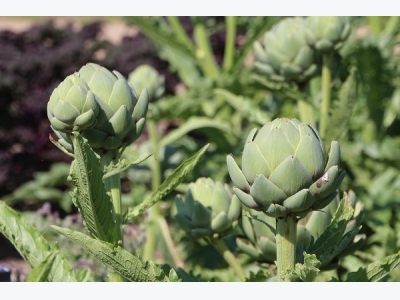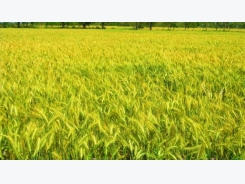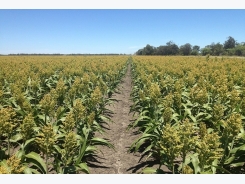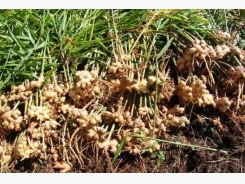Artichoke Farming Information Guide

Introduction To Artichoke Farming: Jerusalem artichoke ( scientific name Helianthus tuberosus ) is also known with the name of ‘German turnip’ , ‘groundnut’ , ‘cane truffle’ , ‘American potato’ or ‘Topinambour’ and it has a very delicate and sweetish flavor which reminds of artichoke. Its origin dates back, not in sure way, to North America area.
There are two main varieties of Jerusalem artichoke: the precocious white one which is already available in Summer and the bordeaux one which becomes ripe from Fall to late Winter. Jerusalem artichoke was eaten for decades and then gradually abandoned, but in the last few years its use in cooking has been rediscovered for its very pleasant flavor, for its properties and organoleptic characteristics and for its high versatility which makes it a basic ingredient to prepare many delicious recipes.
Artichoke Farming – Health Benefits of Artichoke: The following are the health benefits of Artichoke.
- Artichokes help in preventing certain type of cancers.
- Artichokes are good for heart health.
- Artichokes help in controlling blood pressure.
- Artichokes are good for Liver health.
- Artichokes are good for digestion.
- Artichokes are good for bone health.
- Artichokes are good for brain health.
- Artichokes are good for metabolic function.
Artichoke Farming – Jerusalem artichoke (Helianthus tuberosus) is a very tough plant of composite family, almost disease-free, with a woody stem which can easily exceed two metres in height; it lets out distinctive yellow flowers of shape similar to daisies with a diameter of about 10 cm ( 3.15⁄16 in ) . Its roots system is formed by bigger and deeper roots and by smaller and more shallow ones, among with tubers grow. External tuber coloration ranges from violet red to white. Inside it is white – greyish.
Artichoke Farming – It is a plant very undemanding and quite infesting, so once sowed it won’t be easy to get rid of it and almost surely this plant will come to annoy our next crop. For this reason it is suggested to carefully delimit the part of our field to dedicate to this rare vegetable and maybe put it at the margins of our field. Jerusalem artichoke is a very tough plant and it is able to tolerate temperatures up to –18 °C ( about 0° F ) . It resists very well to long periods of drought, while an excessive soil moisture with a subsequent water stagnation can cause tubers putrefaction. Although loose soils ( with a good percentage of sand ) give the best productions, it adapts to any kind of soil and it’s virtually unaffected by pH. Nevertheless, in clayey, heavy and compact soils we may observe some tuber deformations which yet don’t compromise la quality. Moreover, in such soils their harvesting could be less easy, but these problems are not so relevant for small productions of a domestic vegetable garden.
Artichoke Farming – In general, Jerusalem artichoke doesn’t require particular attentions. The fight against pests is limited to early stages, because later becomes highly competitive towards weeds. The only precaution to have it to fight mouses, that are gluttonous of these tubers.
Artichoke Farming – Regarding soil preparation, for a domestic vegetable garden a hoeing or deep digging is enough, taking care to break up the biggest clods. Tubers production is generally high, so it is not necessary to assign a large area to its cultivation. The sowing of tubers, which can be found in supermarkets, gardening stores, nurseries, etc., should be done in spring, if we live in very cold areas. Instead, in hotter regions it can be done even in autumn or winter, since tubers resist very well to cold climates.
Artichoke Farming – To grow Jerusalem artichoke, let’s but the bought tubers underground 6 – 8 centimetres ( 2.23⁄64 in – 3.5⁄32 in ) deep, in furrows or small holes. The distance between the tubers should be at least of 50 cm ( about 20 inches ) . This way we will get 3 – 4 plants for square metre, so we can form a nice bush. Jerusalem artichoke doesn’t need fertilization. Just, at the very moment of sowing it is recommended to put manure or compost ( 3 – 4 kg per square metre ) , incorporating it into the soil.
Artichoke Farming – Irrigation practices can be limited to long periods of drought, but in general too much water can cause a decrease in tubers quality, reducing sugar content. When plants reach a height of about 40 – 50 cm ( 16 – 20 inches ) it is recommended to move a little amount of soil near the plants, covering stem base for the first 10 cm ( 4 inches ) . This practice helps tubers production.
Before winter frost the dried stems are cut back. At this point the tubers harvesting begins and it continue for several months. Jerusalem artichoke is harvested digging the tubers below plants stems, digging up to 10 cm ( 4 in ) deep. The more external stem is big the more we can expect to get big tubers, which should be taken out gradually when we want to eat fresh food and obtain a delicious vegetable. Moreover it is not so easy to preserve these tubers. In fact, in alternative tubers may be conserved outside, in cool air , with temperature between 0,5 e 5 °C ( 32 – 41 ° F ) and high moistness they preserve practically intact for 2 – 3 weeks.
Artichoke Farming – Jerusalem artichoke production can be very high: it can range from 1 kg ( 2 lb 3.273965 oz ) of tubers with adverse conditions and less productive varieties, up to 8 – 9 kg ( 17 lb 10.19172 oz – 22 lb 0.7396480 oz ) per square metre with the best conditions and selected varieties. If we don’t extract all the tubers, the next year they will give a new production, making the plant perennial.
Artichoke Farming – So, in a nutshell:
- Bury the tubers.
- Wait the necessary amount of time and then dig them.
- Leave some tuber in the soil, to make a new production the next year.
- Eat your delicious Jerusalem artichokes :-).
Good Jerusalem artichoke cultivation to everyone!.
Related news
Tools

Phối trộn thức ăn chăn nuôi

Pha dung dịch thủy canh

Định mức cho tôm ăn

Phối trộn phân bón NPK

Xác định tỷ lệ tôm sống

Chuyển đổi đơn vị phân bón

Xác định công suất sục khí

Chuyển đổi đơn vị tôm

Tính diện tích nhà kính

Tính thể tích ao




 Beetroot Cultivation Information Guide
Beetroot Cultivation Information Guide  Ginger Farming Information Guide
Ginger Farming Information Guide